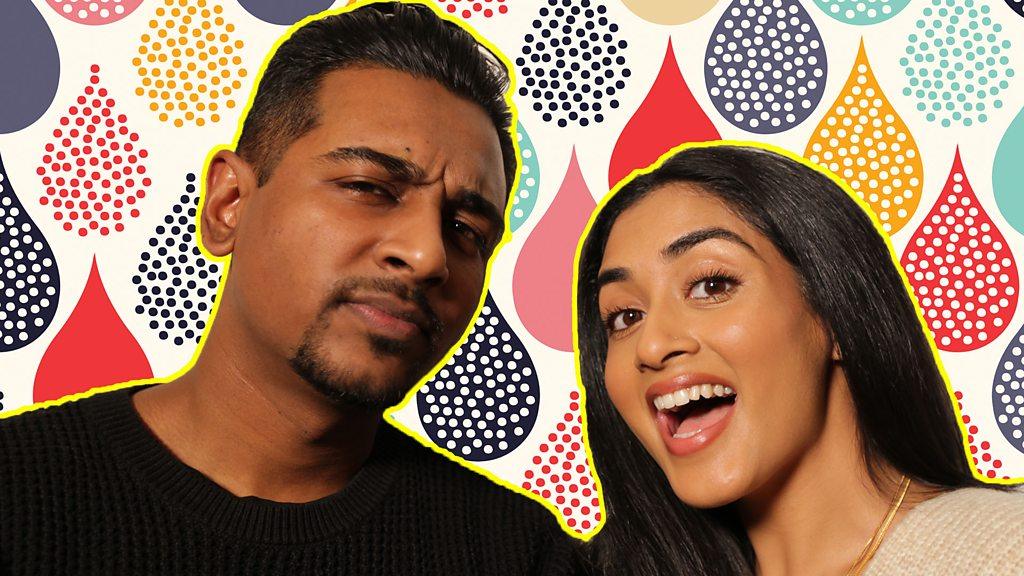Is Will Smith too light for this role and why does it matter?
- Published
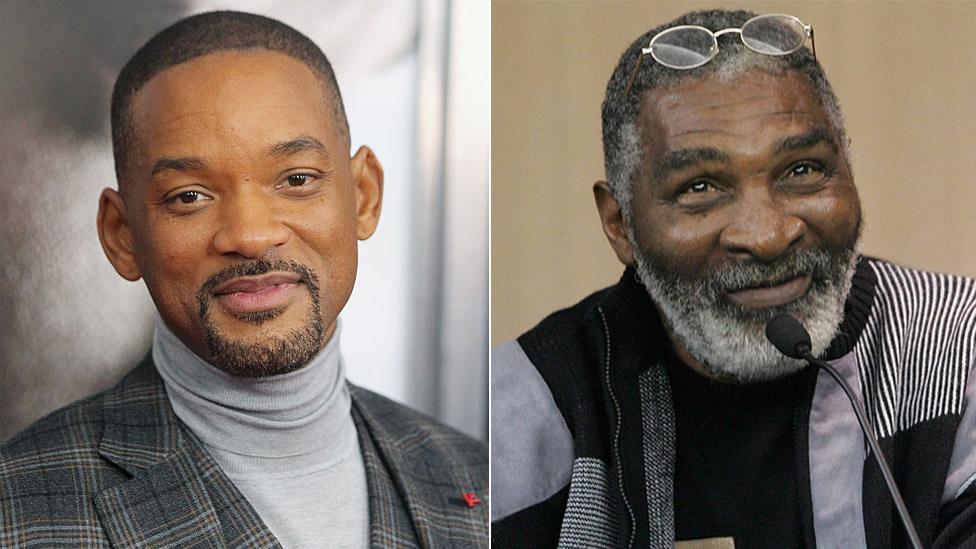
Earlier this week, it was reported that Will Smith could be starring in a new project called King Richard, telling the story of Richard Williams, the father of tennis icons Venus and Serena Williams.
While Smith has yet to confirm the news, it didn't stop fans from tweeting their excitement about the idea of the star portraying such an accomplished man.
But there were a few who weren't so pleased with the choice, and not because they were questioning the star's talent, but because his skin tone isn't considered dark enough.
In recent years, Hollywood has made progress in representing minorities on screen, yet we still find ourselves circling around the issue of colourism.
Allow X content?
This article contains content provided by X. We ask for your permission before anything is loaded, as they may be using cookies and other technologies. You may want to read X’s cookie policy, external and privacy policy, external before accepting. To view this content choose ‘accept and continue’.
What is Colourism?
Colourism is described as discrimination against darker-skinned minorities and the idea that lighter-skinned minorities are given more privilege - and before you complain about the woes of "snowflake millennials" - it isn't a new concept.
In America, colourism has existed since the days of slavery, where the shade of someone's skin often determined which jobs slaves were given.
While dark-skinned slaves had more gruelling work outdoors on the plantations, their light-skinned counterparts usually worked indoors doing more domestic tasks - this preferential treatment occurred because light-skinned slaves were often the product of white slave owners raping their female slaves.
Over time, having a closer proximity to whiteness became a tool for survival and having lighter skin was seen as a desirable asset. Many believe those attitudes are still reflected in Hollywood today.
Colourism in Hollywood
TV and film throughout the decades have offered up a plethora of stereotypes and tropes we've grown accustomed to, such as the mean, popular girls in school or the sassy black friend - and this same logic can be applied to the way certain skin tones have been perceived on screen.
"It's two things, firstly light-skinned people have always been seen as more palatable to the mainstream," says writer and Dazed's TV columnist, Bolu Babalola.
"And when I say mainstream, I do mean white, because there's proximity there to whiteness... they [light-skinned people] are just seen as more acceptable and much easier to consume.
"And dark-skinned people, their experiences navigating race is often so different to light-skinned people's," she continues.
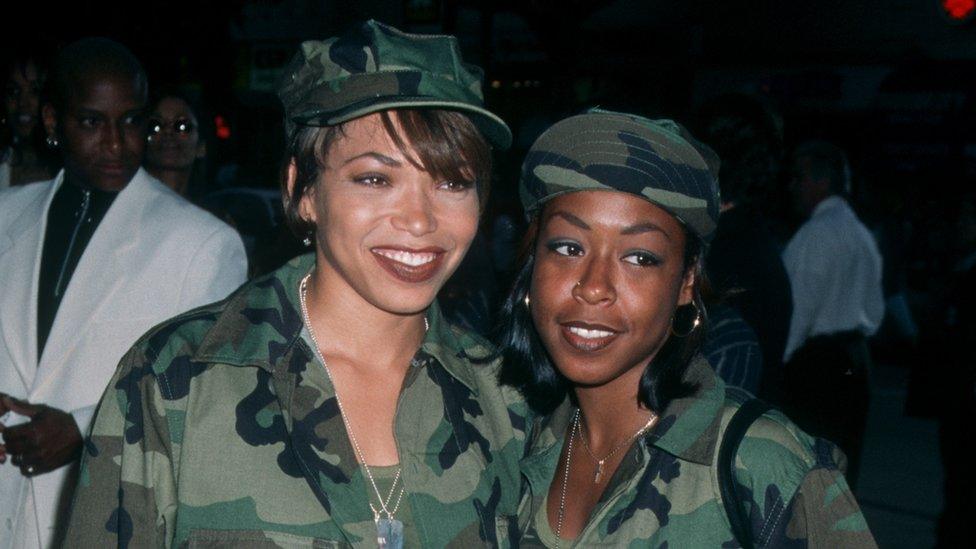
In US sitcom Martin, Gina was played by Tisha Campbell (L) with Pam played by Tichina Arnold
Babalola says darker-skinned men and women are often seen as "animalistic" and "more sexualised" than their counterparts in the media, whereas light-skinned people are often portrayed as more refined, less threatening and more likeable.
A popular example of this dynamic can be seen in Martin Lawrence's 90s US sitcom, Martin.
The title character's light-skinned girlfriend Gina was fun-loving, cool-headed and professional whereas her best friend and assistant, Pam, was more-or-less portrayed as the opposite.
She was sassy, short-tempered and often at odds with Martin, who frequently insulted her throughout the show.
Zoe Saldana under scrutiny
Shows like Netflix's Dear White People were accused of recycling this very same trope in 2017, external, when in the show's first season, its light-skinned protagonist Sam was given ample time to explore her struggles with her mixed-race identity and was also the subject of many men's affections.
However, some viewers thought that Coco and Joelle, Sam's former best friend and current best friend, who are both dark-skinned, were overlooked and underdeveloped.
But in season two of the show, both Coco and Joelle's characters were given more depth both to their characters and story arcs, external.
In 2016, Guardians of the Galaxy actress Zoe Saldana came under scrutiny for taking on the role of Nina Simone in a film about the singer, after photos of her wearing darker make-up and a prosthetic nose surfaced online.
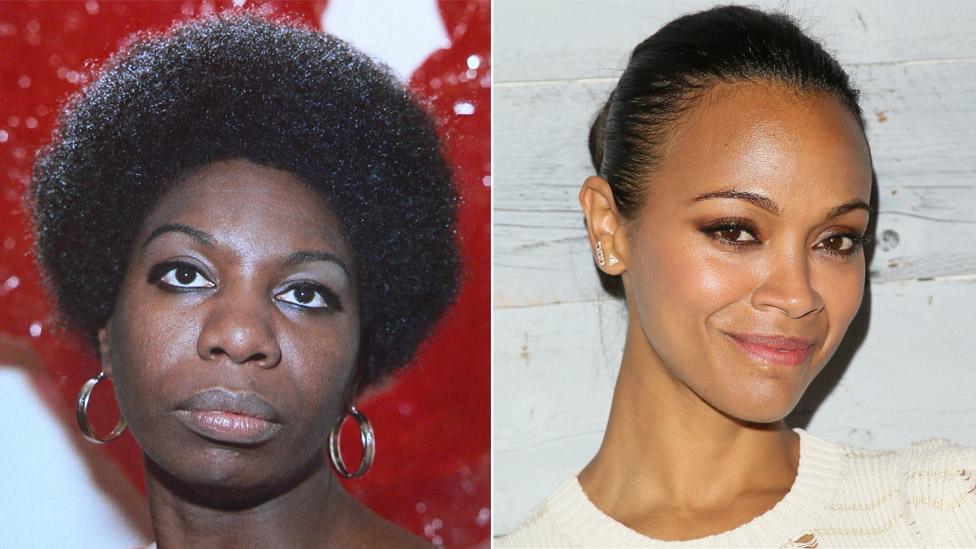
Nina Simone [L] was played by Zoe Saldana
Many of Simone's fans were unhappy with the casting and disapproved of Saldana's role, citing the singer's skin tone and appearance as being a vital part of her activism.
Allow YouTube content?
This article contains content provided by Google YouTube. We ask for your permission before anything is loaded, as they may be using cookies and other technologies. You may want to read Google’s cookie policy, external and privacy policy, external before accepting. To view this content choose ‘accept and continue’.
Simone's family, including her daughter, were also upset with the casting and believed other actresses such as Viola Davis would have been more suitable.
Saldana, however, has repeatedly defended her role as Simone, saying, external: "I don't care who tells me that I am not this and I am not that. I know who I am and I know what Nina Simone means to me."
Allow X content?
This article contains content provided by X. We ask for your permission before anything is loaded, as they may be using cookies and other technologies. You may want to read X’s cookie policy, external and privacy policy, external before accepting. To view this content choose ‘accept and continue’.
The Greatest Showman actress Zendaya has often spoken out about the "privilege" she has as a light-skinned black woman, admitting that she's the industry's "acceptable version of a black girl".
"As a light-skinned black woman it's important that I'm using my privilege, my platform, to show you how much beauty there is in the African-American community," she added.
Similarly, The Hunger Games star Amandla Stenberg also noted in an interview with Variety, external, that actresses like her and Zendaya "fill this interesting space of being accessible to Hollywood and accessible to white people in a way that darker skinned girls are not."
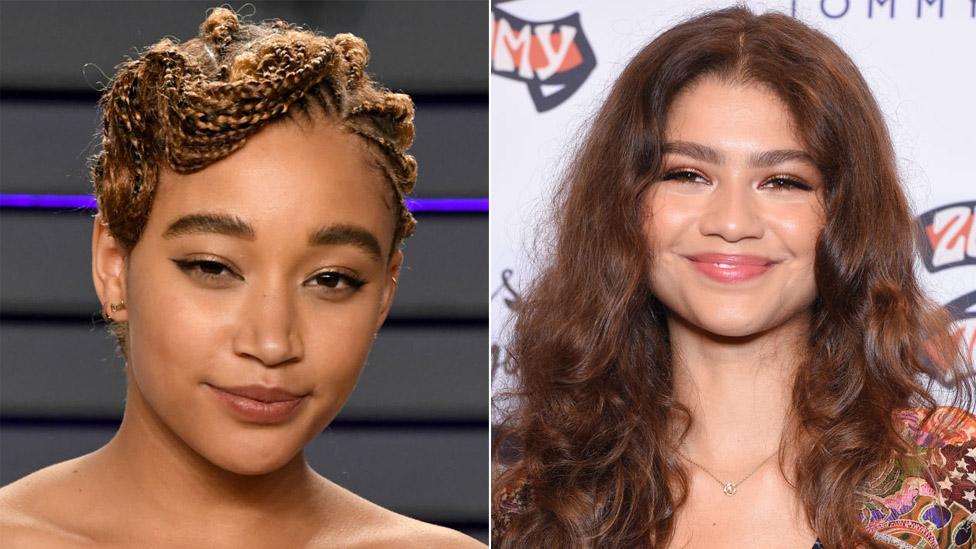
Amandla Stenberg and Zendaya, two of Hollywood's most sought-after talents, often speak out about their light-skin "privilege"
Stenberg has also faced scrutiny in the past for being cast as the lead in The Hate U Give, where her character in the book was originally dark-skinned.
Colourism isn't an issue unique to Black Hollywood though. If you look over to India's Bollywood industry, most if not all of the leading roles go to light-skinned actors and actresses, whereas dark-skinned people are often portrayed as villains and degenerates, external.
This then feeds into India's billion dollar skin lightening industry where some of Bollywood's top actors often endorse these cosmetic products encouraging their adoring fans to lighten their skin.
Why Black Panther was a game-changer
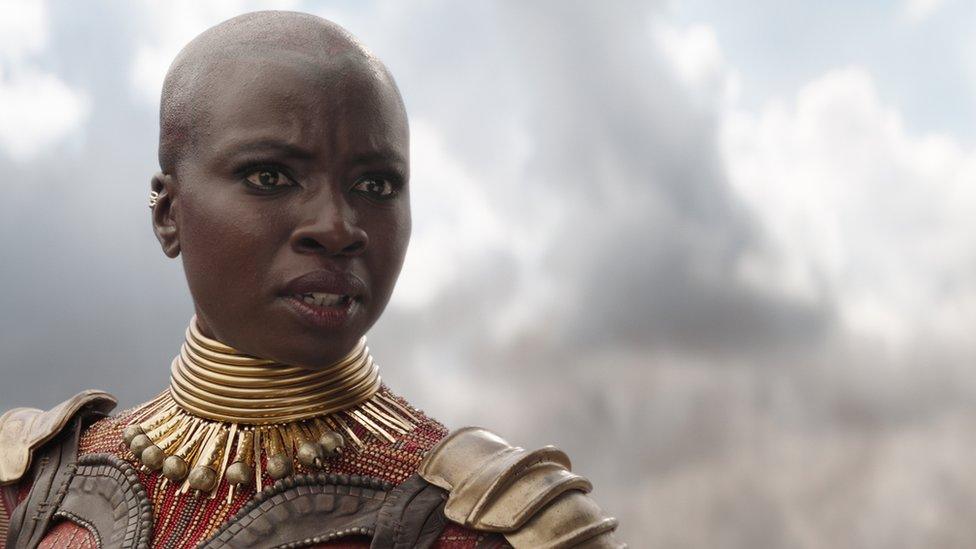
The valiant Okoye [Danai Gurira], the head of Wakanda's armed forces, was a fan favourite
Before Black Panther's triumph, Marvel didn't have the best record for representing its few black characters accurately.
Storm, one of the most prominent black superhero figures is the descendant of an ancient line of African priestesses, has always been drawn as a dark-skinned women in Marvel's comics. But for the last 20 years, she has been portrayed as a light-skinned woman in every live-action film.
She was first played by Halle Berry in the X-Men trilogy from 2000 and then again in X-Men: Apocalypse with Alexandra Shipp in 2016, which was met with fierce criticism in 2017 across Twitter, where Shipp dismissed the conversation about Storm as "stupid", external.
Celebration of black beauty
She opened up about that moment in an interview in 2018, external, saying: "You can't tell me that I can't play a woman of colour because I don't match the Crayola marker from 1975 when they drew the comic, that makes no sense.
"If all of us band together in a perfect world and say no, this is meant for a dark-skinned actress, the studio would say 'you've lost your damn mind' and hire a younger, light skinned actress, " she added.
But Black Panther broke new ground.
Aside from the millions of pounds it raked in at the box office, and awards including three Oscars for original music, costume and production design, it was hailed as a cinematic celebration of black beauty.
For many, it was the first time fans had seen dark-skinned men and women portrayed in such a positive and heroic light, proving to be a landmark moment of dark-skinned representation in film.
Allow X content?
This article contains content provided by X. We ask for your permission before anything is loaded, as they may be using cookies and other technologies. You may want to read X’s cookie policy, external and privacy policy, external before accepting. To view this content choose ‘accept and continue’.
Allow X content?
This article contains content provided by X. We ask for your permission before anything is loaded, as they may be using cookies and other technologies. You may want to read X’s cookie policy, external and privacy policy, external before accepting. To view this content choose ‘accept and continue’.
BFI Network executive and founder of Bounce Cinema, Mathieu Ajan told the BBC we can't "ignore the fact that darker-skinned performers have been marginalised in the film and television industry for a very long time".
But he said that in the case of the film about Richard Williams, Smith is still "a very accomplished actor" with star power.
"He's selling the film and you're going to get a lot more people's interest in watching it.
'Problem in the industry'
"He's a very hard working actor and there's a lot of reasons to cast him besides the tone of his skin," he added.
Ajan argued that if Smith can do the role justice, then he's the right person for the job.
"The bigger picture of the world of casting is a bigger conversation that goes beyond this particular incident but it is a conversation that needs to be had."
"I don't believe it's a colourism-led casting but there is a problem in the industry," he concluded.

Follow us on Facebook, external, on Twitter @BBCNewsEnts, external, or on Instagram at bbcnewsents, external. If you have a story suggestion email entertainment.news@bbc.co.uk, external.
- Published24 April 2018
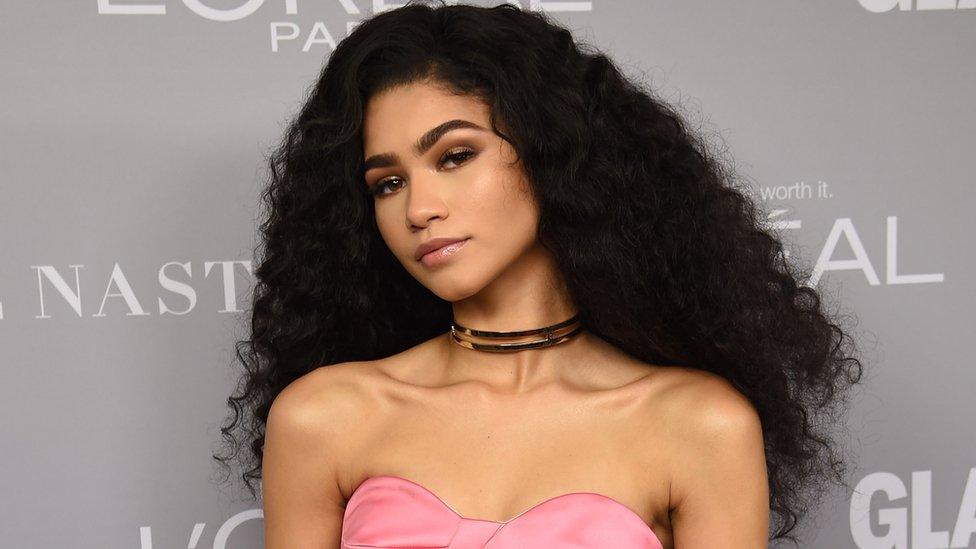
- Published3 August 2018
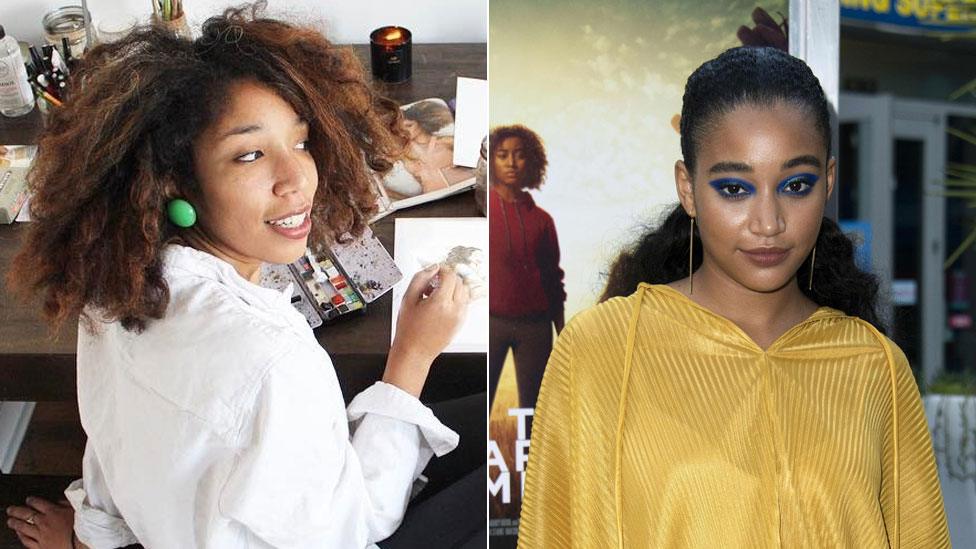
- Published1 February 2019

- Published11 January 2019
